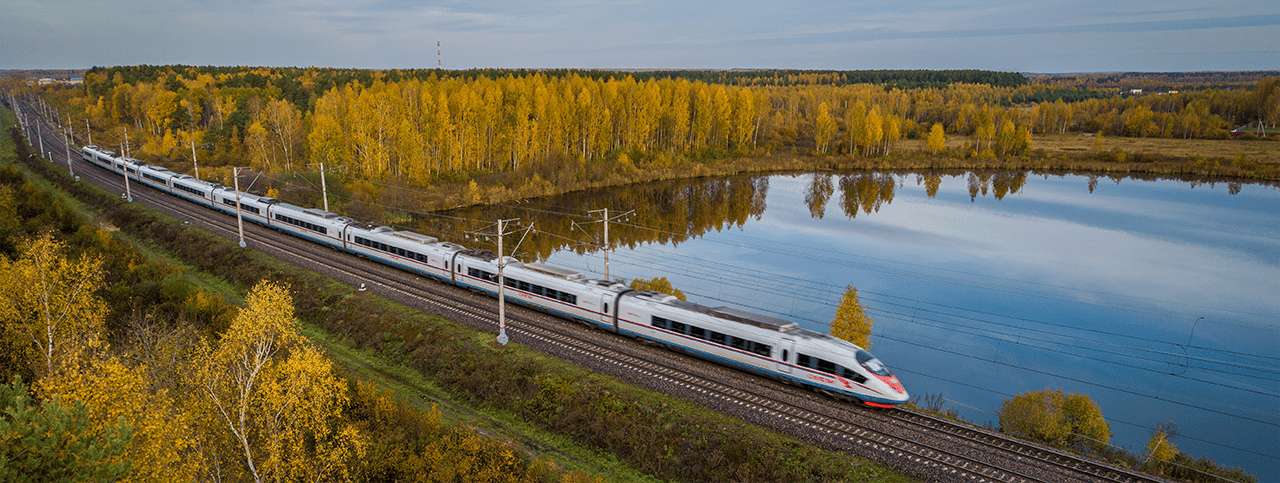Water resourcesGRI 303–2
Clean water and sanitation
Industry, innovation and infrastructure
Responsible consumption and production
The main goal of Russian Railways in water resources management is to curb water use and reduce wastewater discharges on land and into surface water bodies. The Company withdraws water from surface and underground sources solely in accordance with the applicable laws (under water use agreements and extraction licences), without causing any significant impact on the environment. None of the regions of the Company’s operations are classified as areas with water stress.
- The target reduction to be delivered in water resources use is 28%
by 2030Compared to 2018, according to the Long-Term Development Programme. - The target reduction to be delivered in wastewater discharges on land and into surface water bodies is 50%
by 2030Compared to 2018, according to the Long-Term Development Programme.
The Company aims to achieve the reduction by upgrading wastewater treatment facilities, phasing in the best available technologies and engaging the academic community to implement best practices in the area.
Water consumption
In 2021, Russian Railways used 67.35 mcm of water. The Company reduced its consumption after introducing water consumption control and instrumental measurement, dismantling or renovating facilities with a high level of wear and tear, replacing technical building systems and equipment (installing circular water supply systems, replacing water compressor cooling with those using oil cooling, introducing electric heating in buildings, etc.), and carrying out organisational and technical initiatives designed to save water. Scaling down our operations in 2020 was another factor contributing to lower water consumption.
In 2022, the Company plans to reduce its water use by 2.3%.
To ensure sanitary and epidemiological safety for consumers, the Railway Hygiene and Epidemiology Centre performs regular drinking water quality
Russian Railways is implementing a Clear Water project to upgrade railway water supply systems and align the quality of water supplied to consumers with standards set by the Russian sanitation and environmental laws. The project is part of Russian Railways’ Programme for Improving Drinking Water Supply at Railways. The programme features the construction of new and renovation of existing water supply networks; the implementation of de-ironing systems; the procurement and installation of both modular water treatment plants and local industrial water treatment systems. The purpose of the programme is to ensure the quality of the drinking water supply at any sources of Russian Railways’ centralised water supply in line with sanitation and environmental laws.
Wastewater discharge
Pursuant to decisions on granting water bodies for use, Russian Railways conducts scheduled in-process quarterly audits of wastewater discharged into both surface water bodies and centralised water disposal networks.
In 2021, the wastewater discharges on land and into surface water bodies stood at 4.66 mcm across the Company, down 14% (0.8 mcm) y-o-y (target – 4%). In 2022, the Company plans to bring down its wastewater discharge into water bodies by 4.5%.
The most pronounced effect from cutting wastewater discharges into the environment was achieved by the initiatives and projects aimed at the construction and reconstruction of treatment facilities. Also, a significant input came from installing additional filters and equipment, repairing and maintaining treatment facilities as well as construction and comprehensive upgrade of water disposal networks followed by their connection to treatment facilities. Optimising water consumption and saving also had a positive effect.
In 2021, the Company put into operation eight wastewater treatment facilities at the following stations: Smolensk, Moscow Railway, Maloshuyka, Northern Railway, Vekovka, Gorky Railway, Georgiyevsk, North Caucasus Railway, Otrozhka and Belgorod, South-Eastern Railway, Chelyabinsk, South Urals Railway and Syzran-Gorod, Kuybyshevskaya Railway.
Cutting-edge modular facilities for biological wastewater treatment were built at Vekovka as part of the Environmental Safety investment project and became the final component of the station's system of heat supply and water disposal.
Thanks to the new technology, the Gorky Railway decreased the discharge of insufficiently treated wastewater by 58,000 cu m in 2021.
At Vekovka, the cutting-edge modular facilities for biological wastewater treatment helped save more than RUB 700,000. Every year, the discharge of insufficiently treated wastewater will be reduced by 90,000 cu m on average. The Gorky Railway is the only mainline with this wastewater treatment method in place. The new treatment facilities use the membrane bioreactor technology, which eliminates issues arising at conventional wastewater treatment plants. For example, the innovation provides high-level mechanical and microbiological treatment for household and industrial wastewater. When treated, the water can be discharged in fishery water bodies.
